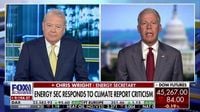On September 3, 2025, a debate flared anew over the future of offshore wind energy in the United States, as U.S. Energy Secretary Chris Wright publicly backed former President Donald Trump’s controversial decision to terminate funding for a major offshore wind project. The decision, which had already drawn sharp criticism from scientists and environmental advocates, was thrust back into the spotlight during a series of appearances by Secretary Wright on Fox Business Channel’s programming, including The Big Money Show and Making Money with Charles Payne.
Secretary Wright’s remarks came as a pointed response to ongoing criticism from the scientific community. Many researchers have expressed concern about the Trump administration’s approach to climate change, particularly in light of a government report that was widely seen as downplaying the urgency of the issue. According to coverage from Fox Business Channel, Wright did not shy away from the controversy. He questioned the rationale behind the offshore wind project, asking, “Why were we doing this?”—a sentiment that quickly became a focal point of the day’s energy policy conversation.
Wright’s comments echoed the Trump administration’s skepticism toward certain renewable energy initiatives, especially those requiring substantial federal investment. Supporters of the administration’s decision argue that offshore wind projects can be prohibitively expensive and may not deliver the promised economic or environmental benefits. “Why were we doing this?” Wright repeated on air, suggesting that the project’s costs and potential impacts had not been fully justified. The question, rhetorical as it may have been, resonated with viewers of The Big Money Show and Making Money with Charles Payne.
Critics, however, see the move as a step backward in the country’s effort to transition to cleaner energy sources. Scientists who have reviewed the Trump administration’s climate report argue that cutting funding for offshore wind undermines the United States’ ability to meet its climate goals and reduces the nation’s competitiveness in the rapidly growing renewable energy sector. According to Fox Business Channel, Wright was undeterred by these arguments, maintaining that the administration’s priorities were focused on “responsible stewardship of taxpayer dollars” and “energy policies that make sense for American families and businesses.”
The backdrop to this renewed debate is a broader, years-long struggle over how the United States should approach climate change and energy policy. Offshore wind, once considered a niche technology, has become a central pillar of many states’ plans to reduce carbon emissions. In recent years, projects off the coasts of New England, the Mid-Atlantic, and California have attracted billions of dollars in investment and generated thousands of jobs. Proponents argue that offshore wind is essential for meeting ambitious renewable energy targets, while providing a reliable source of power that can complement solar and onshore wind.
Yet, as Wright’s comments illustrate, the technology remains deeply polarizing. Opponents often cite concerns about the high upfront costs, potential impacts on local fishing industries, and the visual effect of turbines on coastal communities. Some critics also question whether offshore wind can provide the kind of consistent, large-scale energy output needed to replace fossil fuels. During his Fox Business Channel appearances, Wright aligned himself with these skeptics, arguing that the canceled project “didn’t add up” when scrutinized for cost-effectiveness and real-world impact.
At the heart of the controversy is a broader disagreement over the role of government in driving the energy transition. The Trump administration, and now Secretary Wright, have consistently favored an approach that emphasizes market forces and technological innovation over direct subsidies or mandates. Supporters of this philosophy argue that private industry is better equipped to determine which energy sources are most viable, and that government intervention can distort markets and lead to wasteful spending.
But for many scientists and environmental advocates, the stakes are too high to leave to market forces alone. They point to mounting evidence of climate change’s impacts—from more frequent wildfires to record-breaking heatwaves—and argue that bold government action is needed to accelerate the shift away from fossil fuels. The Trump administration’s climate report, which downplayed some of these risks, has been a particular flashpoint. According to coverage on September 3, 2025, Secretary Wright was quick to defend the report’s conclusions, insisting that it was “based on the best available data” and reflected “a balanced view of the challenges and opportunities facing the U.S. energy sector.”
Wright’s steadfast support for the Trump administration’s policies has drawn both praise and criticism. On Fox Business Channel, he found a largely sympathetic audience, with hosts of The Big Money Show and Making Money with Charles Payne highlighting concerns about government spending and regulatory overreach. “Why were we doing this?” became a refrain throughout the broadcasts, encapsulating a broader skepticism toward large-scale government-backed renewable energy projects.
Still, the debate is far from settled. Environmental groups and many scientists continue to push for aggressive action on climate change, including expanded investment in offshore wind and other renewables. They argue that the costs of inaction—ranging from damage to coastal infrastructure to lost economic opportunities in the clean energy sector—far outweigh the price of government support. As one scientist put it in response to Wright’s remarks, “If we’re serious about tackling climate change, we can’t afford to let short-term costs blind us to the long-term benefits.”
For now, the future of offshore wind in the United States remains uncertain. The Biden administration, which has signaled strong support for renewables, may yet seek to revive or replace the canceled project. But with the 2024 election still fresh in the nation’s memory and energy policy once again at the center of political debate, the path forward is anything but clear.
As the dust settles from this latest round of sparring, one thing is certain: the question “Why were we doing this?” will continue to echo through the halls of Congress, the studios of business news channels, and the minds of policymakers grappling with the difficult choices ahead.




